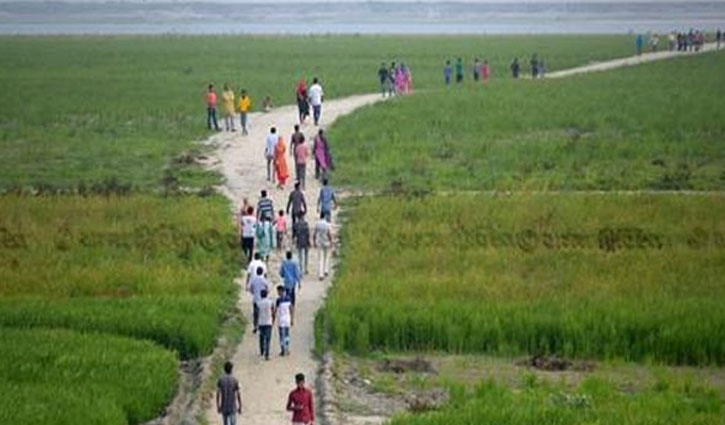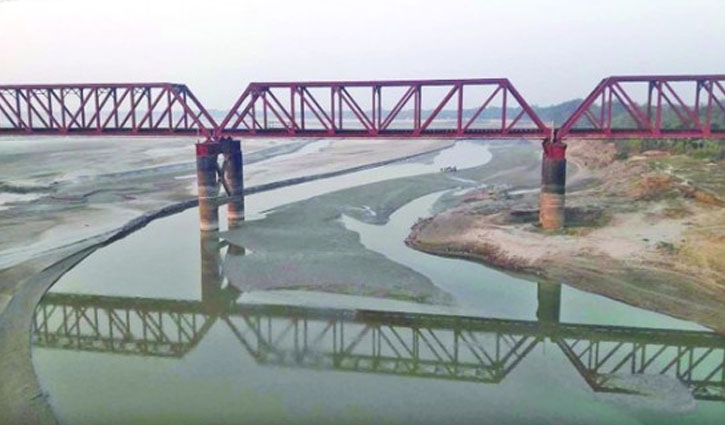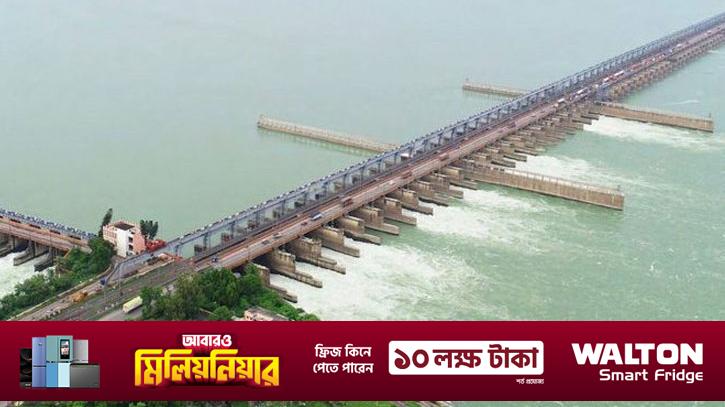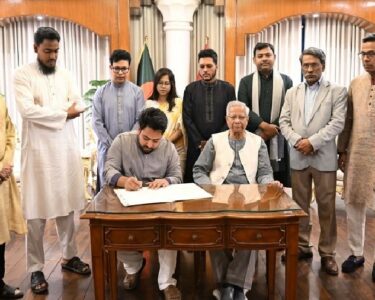A high -level delegation of Bangladesh is going to visit Kolkata to discuss renewing before the expiry of the thirty -year Ganga Water Agreement between Bangladesh and India.
The 5 -member delegation of Bangladesh is expected to arrive in Kolkata on Monday (March 7). On a five-day visit, they will hold a renewal meeting in Kolkata; Visit Farakka Dam.
Senior Joint Commissioner of the Central Water Power Ministry RR Sambaria wrote a letter to West Bengal Chief Secretary Manoj Pantra and detailed the Bangladesh delegation visit. In the same letter, the delegation of Bangladesh has been directed to take adequate security measures.
The Ganga Water Agreement was signed between Bangladesh and India on December 12. Sheikh Hasina was the Prime Minister of Bangladesh and HD Dev Gauda was the Prime Minister of India.
The Ganga Water Agreement expires in 2021. Before that, there is talk of renewing the agreement in both countries. Sheikh Hasina's visit to India before being ousted in 2021 was talked about renewing the Ganges water agreement.
In India, the river, known as Ganga, is the Padma River of Bangladesh. The Gangotri Glacier of the Himalayas originated from the Glacier Glacier and Padma met in the Bay of Bengal through India. After the Farakka Dam, Padma gradually dried up and turned into a desert.
During the dry season in Tapinawabganj, Rajshahi, Kushtia, Pabna, huge shelf woke up in the dry season. Not only the Padmai is in the crisis of water flow, many small rivers originating from Padma are also dry, or the narrow canal, or has died. Bangladesh wants a fair account of Ganga water. This time the discussion will be important.

Once upon a time, the dry season crop is now cultivated in the chest of Padma.
According to the letter written by Sambaria, the 9th meeting of the Joint River Commission of Bangladesh and India will be held in Kolkata on March 7-7. Prior to that, Bangladesh delegation and Indian officials will visit the Farakka Dam on March 5-7.
A 5 -member representative led by Bangladesh member Muhammad Abul Hossain, a member of the Joint River Commission, will participate in the discussion with Indian officials in Calcutta.
Writing to the Chief Secretary of Kolkata and the letter signed by Sambaria details about the tour program. Accordingly, the delegation of Bangladesh will travel to Farakka on that day after the Bangladesh delegation arrived in Kolkata by 5am on Monday, March 7. On March 7, they will monitor the water flow statistics in Farakka. They will return to Calcutta on March 7 after the observation. Representatives of the two countries will meet at a five -star hotel in Kolkata on March 7 and 8.
The Bangladesh Nationalist Party-BNP has criticized the agreement for a long time, despite the expiry of the Ganga water agreement. They complain that the Ganga Water Agreement has only protected India's interests; The loss of Bangladesh.
Although the BNP is dissatisfied with the Ganga water agreement, the renewal of the agreement is being discussed this time during the interim government. As a result, the interim government is curious about what kind of position it takes.
Water experts in Bangladesh and various parties, including the BNP, are emphasizing the increase in water flow from the Ganges. Dhaka will ask for more water than ever before. Whether India will accept that claim depends on the state government of West Bengal.

Hardinge bridge underneath the dusty shelf.
West Bengal Chief Minister has said many times that water is not in the Ganges to give Bangladesh extra. The demand for West Bengal does not meet the water of the Ganges; How to give Bangladesh more water?
The Joint River Commission works with six rivers in Bangladesh and India. Ganga or Padma is her one. Despite the Ganga agreement, the Teesta river has been talking about the water distribution agreement for a long time. However, that agreement has not been done yet. The BNP recently rallied at Teesta Para to understand the fair account of the Teesta river. This time, the meeting of the Indian officials with the Bangladeshi representatives spread the issue on the issue of the Teesta issue.
Ganga Water Agreement which is in which there is
India built the Farakka Dam on the Ganges River in the 5th. As a result, Bangladesh reduced the flow of water from the Ganges, which became a threat to the rivers and agriculture of the country. The construction of unilateral dams on the international river started in Bangladesh. After a long discussion and review, the Government of India agreed to sign a Ganga agreement with Bangladesh and the agreement was completed in the 5th.
According to that agreement, the two countries will share water in the dry season, ie January 1st to May 7. The agreement states that if there are 4,000 cusecs or less water in the river, the two countries will divide equal water. Bangladesh will get 4,000 cusecs if the amount of water is 1 thousand cusecs from 1 thousand cusecs. The rest will flow in India. Again, if the river water flow is 4,000 cusecs or more, India will get 4,000 cusecs of water. The remaining water will flow in Bangladesh.
However, if the Farakka river water flows below 4,000 cusecs, then the amount of water in the two countries will decide on the basis of mutual discussion.
The Farakka Dam was constructed to supply water to the Hooghly River in India and to operate the Kolkata port, which is located on the Ganges river on India's territory 5 km from Bangladesh.
In more than four decades, the dam has changed drastically in the Ganges basin, which causes both countries to suffer.
Bihar's Chief Ministers are seeking a permanent solution by removing the Farakka Dam with the government as floods and waterlogging are created every year in Bihar and Uttar Pradesh. The same demand is the environmentalists of Bangladesh. Because of this dam, several districts of the northwest of Bangladesh are also under floods and river erosion during the monsoon season.
Bangladeshi environmentalists complain that India is detained when water is needed. And during the rainy season, Farakka's gate opens. As a result, this problem needs to be resolved in the renewal of the Ganges water sharing agreement.
Teesta
West Bengal Chief Minister Mamata has also objected to the Teesta Treaty. The central government of India agreed that the Teesta agreement was prepared for several rounds, but it could implement it because of Mamata's bug.
Although the Teesta water agreement is not signed, the issue of the Teesta great plan or the construction of the Teesta barrage came to the fore in 2021. Although the implementation of this great plan on China's debt, India has come forward. In the end, the Sheikh Hasina government also leaned towards India. Of course, after the fall of Hasina on August 7 in the mass uprising, the discussion did not move.
👇Follow more 👇
👉 bdphone.com
👉 ultractivation.com
👉 trainingreferral.com
👉 shaplafood.com
👉 bangladeshi.help
👉 www.forexdhaka.com
👉 uncommunication.com
👉 ultra-sim.com
👉 forexdhaka.com
👉 ultrafxfund.com
👉 bdphoneonline.com
👉 dailyadvice.us



